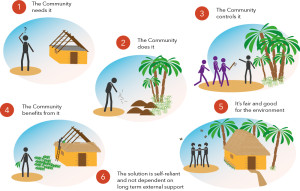 Why are we advocating community owned solutions?
Why are we advocating community owned solutions?
- Highly marginalised groups, such as Indigenous peoples, are generally represented as ‘poor’, ‘backwards’ and ‘requiring help’.
- This deficit model too often prevails at all levels of policy and decision making, where government and market-led approaches to sustainable development are generally designed by external experts.
- Many of these policies propose generic, blueprint solutions which may undermine already existing local solutions.
- The Cobra Collective has shown that Indigenous peoples and other marginalised groups are a source of inspiration, and have multiple solutions for adapting to current and emerging challenges.
- The global community can learn from these solutions by providing adequate and authentic representation of highly marginalised groups at all levels of decision making.
Community owned solutions are practices developed to face up to one or more challenges and are carried out by communities themselves. The solutions contribute to the community’s well-being in the present and in the future. They are born, developed and successfully implemented within the community by the community and without major influence from external stakeholders. Community owned solutions have the following characteristics:
- Local demand – the practice comes from local community demand for economic, social, or environmental benefits, or as a reaction to the loss of these benefits.
- Local action – the practice is carried out by local people, although there may be a level of support by outside partners from government, civil society, or the private sector.
- Local management – the planning, implementation and evaluation of the practice is organised locally.
- Local benefits – benefits occur primarily within the community but regional, national, and global benefits may also occur.
- Ethics – the practice does not have a negative impact on the local and global environment, and where possible, can even enhance local and global biocapacity; financial benefits are distributed fairly; participation is from all sections of the community and there is no discrimination.
- Self-reliant - the practice is self-reliant and not dependent on long term external support.
Community owned solutions can provide a source of inspiration and practical action for both Indigenous and non-Indigenous communities to preserve multiple benefits, including emission reductions, biodiversity conservation, water resources, food security, regulating regional climate, and maintaining cultural heritage.
The Cobra Collective aims to promote and inspire community owned solutions to social and environmental challenges around the world, using its members’ expertise in community engagement, visual techniques and environmental management. The Collective works with community organisations, NGOs, international agencies and policymakers through training, research and implementation to enhance social justice and ecological sustainability.
 Why are we advocating community owned solutions?
Why are we advocating community owned solutions?



